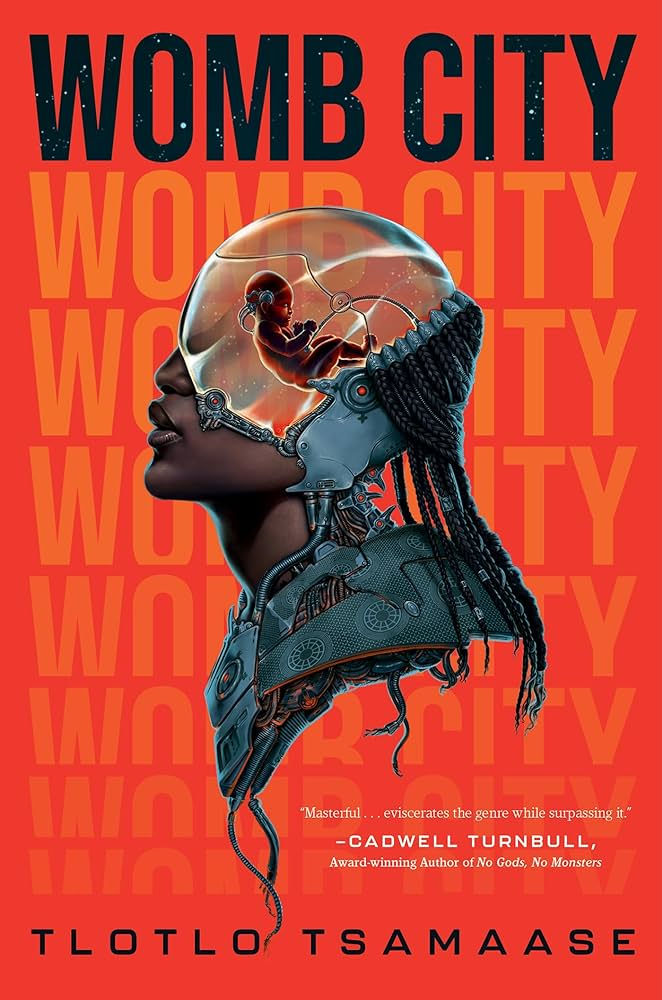Womb City
- Greg Barlin

- Jan 14, 2024
- 4 min read
by Tlotlo Tsamaase ★★☆☆☆

I first noticed Womb City, the debut novel from Motswana author Tlotlo Tsamaase, on Amazon's Best Science Fiction books of January. I liked the cover art, and very briefly skimmed over some of the summary. "Surveillance state", "desperate crime", "political conspiracy" -- these are all concepts that find their way into plenty of books that I enjoy. It all added up to a compelling enough concoction that I figured I'd give it a try.
I like to go into most books with very little preconceived notion of the plot or what direction it might head. In this case, I think I would have benefitted from a closer read of the book description. I went in thinking that this might be a fresh take on Minority Report, and that's exactly how the book started out. Our main character, Nelah, begins each day with her husband scanning the microchip embedded at the base of her neck. That allows him to see everything she saw for the past 24 hours, ostensibly to "scan (her) memory files for undetected infractions". Like in Minority Report, a system has been put into place that has effectively eradicated crime. Forensic assessments catch the majority of criminal intent before it occurs, and the secret "Murder Trials" act as a backup where the assessments sometimes fail. The microchip is a final failsafe.
It was a promising start to the novel. But before long, things started to come unraveled. Nelah begins a lengthy affair supplemented with illegal drug use, something that seemed preposterous to me knowing that her husband will be reviewing her every move for the previous 24 hours and they live in a society that ostensibly alerts authorities to "pre-crimes" (to borrow the Minority Report term). It's explained away by a magic device that her lover introduces that blocks the recording of the situation. Okay, fine. Except that then raised questions for me that lacked the same tidy explanation. Nelah has never seen the device before...yet she slept with this person a year prior. So, was that initial bout of infidelity recorded? How did her husband not discover the infidelity during the daily scan? And if he had discovered it, why doesn't he recognize this person when he crops up again? While the device blocks the actual illegal drug use, isn't the whole system supposed to identify intent before it happens? Or guilt after if it somehow goes undetected? This sort of scenario perpetuates throughout the book -- either there's a gaping hole in the plot, or the attempt to close a hole is done partially and, in several instances, lazily. I'll give you an example: at one point, near the end of the novel, the following exchange takes place, after (again) an unexplained moment that makes so little sense it even baffles the characters:
"How do you know all of this?" I ask.
"When I rose from my dead body, this 'knowing sense' and voices filled my mind," she says, eyes glazed, lost in the memory.
A "'knowing sense' and voices filled my mind"? That's a convenient explanation. We can do better than that, can't we?
You may be reading the quoted passage above and have picked up on the "rising from a dead body" portion. For whatever reason, I missed the mention of "ghost" in the book description, and that's a huge part of this novel. It plays no role in any part of the first 30% or so of the book. Then, suddenly, it is all-encompassing. Finding a way to stop the ghost from killing all of Nelah's loved ones becomes her sole focus for much of the rest of the novel. It's a head-scratching turn, and it creates a slew of plot holes and unexplained scenarios. It also shifts the genre from something that was entirely sci-fi to something that is almost entirely horror (and, it should be noted, violent and grisly horror), seemingly out of nowhere. It was a head-scratching choice.
In addition to the plot holes, I think my biggest challenge with Womb City was that it felt like Tsamaase had a hard time choosing to leave anything out. I see this occasionally with debut novels; Firekeeper's Daughter comes to mind. It was a debut novel that I loved, but in my review I wrote that "at nearly 500 pages I think there may have been an unconscious desire to get everything into this first book." Something similar happens here, but where Angeline Boulley managed to keep Firekeeper's Daughter focused and moving in a consistent direction, Tsamaase's inability to self-edit the concepts she includes ultimately torpedos the successfulness of the novel.
To help explain the disjointedness, consider that within the 416 pages of Womb City we find the following: a sci-fi plot line lifted straight from Minority Report, a romance/affair, a murder, a grisly ghost-driven horror story plot line, a political conspiracy, an ultra-powerful god-like entity, plus plenty of commentary on women's rights, misogyny, the source of a person's identity, immortality/reincarnation, and more. Human trafficking even makes a brief appearance! As stand-alone concepts, Tsamaase treats many of the above pretty well. But when thrust together, it becomes a mess, to the point that I was laughing out loud at the direction things took in the final pages of the book. There were stand-alone moments that were well done, be it insightful commentary on weighty topics or some well-rendered action sequences. But when all of it was combined, the whole was certainly not greater than the sum of its parts, and the inclusion of so many disparate components along with their inartful combination are the choices that cause this novel to suffer the most. I see Tsamaase's potential as a writer, but Womb City did not come together well.



Comments